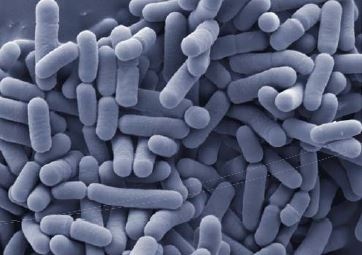Etiology of Mastitis: The Role of Infection and Microbiota
Etiology of Mastitis: The Role of Infection and Microbiota
Jose Hurtado
Key Messages
- A diverse microbiota may be ob-served in human milk
- Dysbiosis of human milk microbiota could be related to the onset of mas-titis
- Probiotic treatment may help to bal-ance this microbiota and to prevent mastitis
Human milk contains a diverse micro-biota. Studies about this microbiota show a complex bacterial community in which species of the genus Pseudomonas, Streptococcus, or Staphylococcus abound together with species of Bifidobacterium, Lactobacillus, Propionibacterium, Enterococcus, etc. [1, 2]. As in other microbiota, this community of species remains in balance; however, occasionally some specific populations may overgrow, leading to a dysbiosis, which in the mammary gland might progress to mastitis [3]. Mastitis is an inflammatory condition of the breast usually associated with lactation. Dysbiosis in mastitis is characterized by a proliferation of certain bacterial species, such as Staphylococcus spp., which have been identified as one of the main bacterial groups re-lated to mastitis.
The administration of some strains of Lactobacillus to lactating women might help to prevent mastitis. Image source: “Particle Systems” Groups, Nestlé Research Center, Lausanne.
Mastitis is also related to a loss of diversity in milk microbiota. In a comparative study between milk microbiota of healthy women and that of women suffering from mastitis, a notable decrease was observed in the percentage of samples contain-ing DNA from different genera such as Lactobacillus, Bifidobacte-rium, Bacteroides, Parabacteroides, Faecalibacterium, Ruminococcus, Roseburia, Eubacterium, and Propio-nibacterium [3]. The loss of Lactoba-cillus in milk microbiota of women suffering from mastitis was first ob-served in a study performed by Jiménez et al. [4]. They proved that a high level of Staphylococcus spp. in milk was accompanied by a decrease in Lactobacillus spp. However, when a combination ofLactobacillus strains originally isolated from breast milk of healthy women was provided to these women, the load of Staphylococcus spp. in milk was significantly reduced, andLactobacillus could be detected. Along with the changes observed in the milk microbiota, Lactobacillus ad-ministration induced a very significant improvement in the symptoms re-lated to mastitis. Subsequently, differ-ent studies have demonstrated the capability of certain probiotic strains to balance the microbiota of human milk by reducing the load of bacterial groups related to mastitis and thus improving the associated symptom-atology [4–8].
The Lactobacillus strain with more scientific evidence in the field of human mastitis is L. fermentum CECT5716. This is a probiotic strain isolated from breast milk of healthy women endowed with a powerful an-ti-infectious activity probably related to its antibacterial activity and im-mune-enhancing activity [9, 10]. Two different trials conducted in women suffering from mastitis showed a significant improvement in mastitis condition by decreasing the Staphylococcus spp. load in breast milk [5, 6]. Additionally, a trial conducted in healthy women showed that the con-sumptionofL. fermentum CECT5716 during breastfeeding reduces the inci-dence of mastitis by approximately 50% relative to its capability to control the proliferation of Staphylococcus spp. in milk [8]. These results prove that probiotic treatment is an effective strategy to control the proliferation of Staphylococcus in breast milk, helping to prevent the development of mastitis.
References
- McGuire MK, McGuire MA: Human milk: mother nature’s prototypical probiotic food. Adv Nutr 2015;6:112–123.
- Collado MC, Delgado S, Maldonado A, Rodríguez JM: Assessment of the bacterial diversity of breast milk of healthy women by quantitative real-time PCR. Lett Appl Microbiol 2009;48:523–528.
- Jiménez E, de Andrés J, Manrique M, Pareja-Tobes P, Tobes R, Martínez-Blanch JF, Codoñer FM, Ramón D, Fernández L, Rodríguez J: Metagenomic analysis of milk of healthy and mastitis-sufferingwomen. J Hum Lact 2015;31:406–415.
- Jiménez E, Fernández L, Maldonado A, Martín R, Olivares M, Xaus J, Rodríguez JM: Oral administration ofLactobacillus strains isolated from breast milk as an alternative for the treatment of infectious mastitis during lactation. Appl Environ Microbiol 2009;74:4650–4656.
- Arroyo R, Martín V, Maldonado A, Jiménez E, Fernández L, Rodríguez JM: Treatment of infectious mastitis during lactation: antibi-otics versus oral administration ofLactoba-cilli isolated from breast milk. Clin Infect Dis 2010;50:1551–1558.
- Maldonado-Lobón JA, Díaz-López MA, Carputo R, Duarte P, Díaz-Ropero MP, Valero AD, Sañudo A, Sempere L, Ruiz-López MD, Bañuelos Ó, Fonollá J, Olivares Martín M: Lactobacillus fermentum CECT 5716 reduces Staphylococcus load in the breast-milk of lactating mothers suffering breast pain: a randomized controlled trial. Breast-feed Med 2015;10:425–432.
- Fernández L, Cárdenas N, Arroyo R, Manzano S, Jiménez E, Martín V, Rodríguez JM: Prevention of infectious mastitis by oral administration ofLactobacillus salivarius PS2 during late pregnancy. Clin Infect Dis 2016;62:568–573.
- Olivares M, Díaz-Ropero MP, Martín R, Rodríguez JM, Xaus J: Antimicrobial potential of fourLactobacillus strains isolated from breast milk. J Appl Microbiol 2006;101:72–79.
- Olivares M, Díaz-Ropero MP, Sierra S, Lara-Villoslada F, Fonollá J, Navas M, Rodríguez JM, Xaus J: Oral intakeofLactoba-cillus fermentum CECT5716 enhances the effects of influenza vaccination. Nutrition 2007;23:254–260.
- Hurtado JA, Maldonado-Lobón JA, Díaz-Ropero MP, Flores-Rojas K, UberosJ, Leante JL, Affumicato L, Couce ML, Garrido JM, Olivares M, Fonollá J; PROLAC Group: Oral administration to nursing women ofLactobacillus fermentum CECT 5716 pre-vents lactational mastitis development:a randomized controlled trial. Breastfeed Med 2017;12: 202–209.